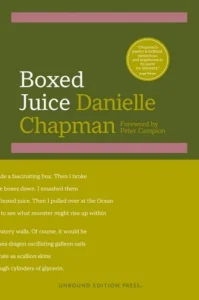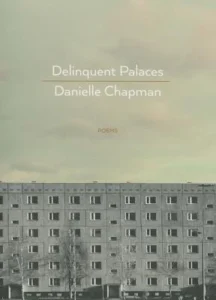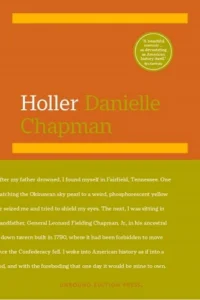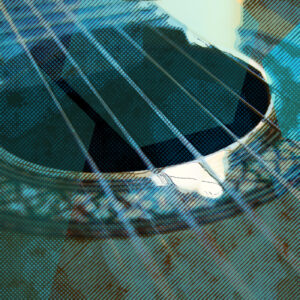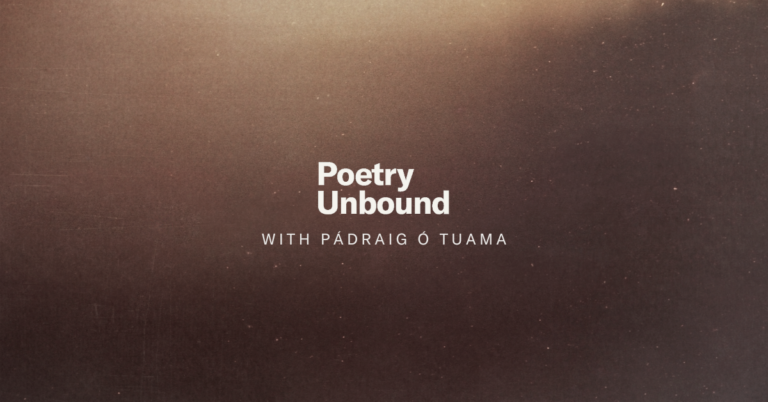Danielle Chapman
Trespassing with Tweens
Wonder and strangeness commingle with the commonplace and universal in Danielle Chapman’s “Trespassing with Tweens.” In a not-quite mirroring, a human mother and her children stand and watch together in awe as a great blue heron flaps in and feeds its two offspring. The pleasures found here are profound and multiple – the joys in seeing, in sharing an experience of seeing, in seeing with fresh eyes, and in being seen.
We’re pleased to offer Danielle Chapman’s poem and invite you to subscribe to Pádraig’s weekly Poetry Unbound Substack newsletter, read the Poetry Unbound book, or listen to past episodes of the podcast. We also have two books coming out in early 2025 — Kitchen Hymns (new poems from Pádraig) and 44 Poems on Being with Each Other (new essays by Pádraig). You can pre-order them wherever you buy books.
Guest
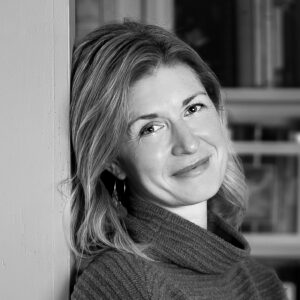
Danielle Chapman is a poet, essayist, and lecturer in English at Yale University. Her most recent collection of poetry, Boxed Juice, was published in 2024 by Unbounded Edition Press. Her previous collection of poems, Delinquent Palaces, was published by Northwestern University Press in 2015, and her memoir, Holler: A Poet Among Patriots, was released by Unbound Edition Press in 2023. For several years, Chapman served as the Director of Literary Arts and Events for the City of Chicago, and she was also an editor at Poetry Magazine. She currently teaches Shakespeare and creative writing and lives in Hamden, Connecticut, with her family.
Transcript
Transcription by Alletta Cooper
Pádraig Ó Tuama: My name is Pádraig Ó Tuama, and because I don’t have children, all of my opinions about parenting are absolutely fantastic, and all of my fantasy hypothetical children are perfectly well-behaved, and we’ve never had any kind of difficulty, and they transitioned from childhood to teenagerhood to adulthood perfectly and easily with our relationships intact. [laughs] Obviously, none of that’s true, but what interests me when I look at parents is the exhausting way within which right from day one, it seems, you are bringing somebody up and caring for them with the idea that they’ll move away. And that is a complicated face of love, a beautiful face of love, a self-giving face of love, but one that I never cease to wonder at.
[music: “Praise the Rain” by Gautam Srikishan]
“Trespassing with Tweens” by Danielle Chapman
“After arguing, gasping up at the Great Blue
Herons flap into the cypresses, we hush into mosses
and fallen needles auburn as wood doves.
“All around us the forbidden Water
District’s lily pads flex their mirrored hides.
“Now another clatters back from his wide hunter’s glide,
brings in his wings’ ungainly myth,
folds his fishermen legs and straightens the tremendous
S-beard of his neck.
“His pterodactyl face, almost all beak,
focuses in a yellow twinge that wells into an eye;
a black stripe streaks into his crest’s flung jot.
“You hate how distracted I get, my incomprehensible flights.
But you comprehend this pair of herons
sitting down on their extravagances to feed their chicks.
“And now you’re shrieking at their clucks, their gullying barks.
For a heron parent has tilted his or her face
formally as a watering can toward a vase
fluffed by what we’re certain is
(Look, Mommy, look
look look!)
two smaller beaks and an opening.”
[music: “The Willows” by Gautam Srikishan]
This is a poem that works on so many different levels all at once. On the one hand, it’s an extraordinary depiction of a heron family — two adults and two chicks — and it’s also a depiction of a human family watching a heron family. And we see hunger in the chicks as the poem reaches its end, but we also hear some kind of tension between the human family — the poet, the mother, and offspring. “After arguing,” we hear in the first two words. This is a parent with tweens, a word that I looked up just to be sure that I understood it properly. Tweens is the few years before teenager-hood. I suppose a way of talking about some kind of transition time, some kind of time when people are developing independence, but also not independent and feeling the wrestle and the tug of that.
Obviously, I think that the trespassing of the poem’s title is very specific to a certain incident of trespassing — rule-breaking — by Danielle Chapman and her offspring. But I wonder, does the word trespassing go into some other direction as well? Does parenting a pre-teen sometimes feel like trespassing? Trespassing on where you don’t want to go, where you’re not supposed to go? Trying to figure out what is and what isn’t the boundary in terms of how we relate to each other now. That seems to me to be part of the invitation of thinking about the relationship between the speakers in this poem — the poet — and then the children — the tweens — who say, “look, Mommy, look / look look!” I love the repetition of the word “look” there. It’s almost like the poem is inviting us to curiosity, not only about the herons feeding the chicks but also about the parent with independence growing young people in her care, who also want to look after themselves in as much as they’re able.
[music: “Creatures of Myth” by Gautam Srikishan]
I learned so much about poetry and about great blue herons from reading this poem by Danielle Chapman. The locale of these particular herons, the cypresses, but then also the way that Danielle Chapman describes them. The sound of them “clatters” and their flight is described as “a wide hunter’s glide,” and this particular heron’s “his wings’ ungainly myth,” and the body “fishermen legs” and “the tremendous / S-beard of his neck,” and then “his pterodactyl face, almost all beak.” And there’s the sound repeated later on, not from the adult herons, but from the chicks, “their clucks, their gullying barks.” I wondered how long you have to spend listening to these unwritten words to be able to write them down in a way not that it is the exact scientific description, but it’s the sound of what they do sound like: a “gullying bark,” the “clatter.” And then also the “wing’s ungainly myth.” Putting myth with the descriptor ungainly here is such an interesting tension. To see the enormity of this bird that is so fluent in how it gathers food and how it distributes food and water to its offspring, but nonetheless, how strange it looks to see this long, stretched-out bird flying through the sky.
I love the demand of this poem. It’s even difficult at times to say some of the phrases, “a black stripe streaks into his crest’s flung jot.” I had to practice that over and over again to make sure that I could just make it like some kind of piece of music in my mouth. I think partly what we’re being brought into is the description upon description upon description of wonder, of attention, and of how it is that language is seeking to move toward something that we will never be able to capture, which is the magnificence of what we see and what we look at when it’s right in front of us.
[music: “Daybreak” by Gautam Srikishan]
That interruption of the line, “You hate how distracted I get, my incomprehensible flights.” What are the “incomprehensible flights?” Maybe it is the fact that parents need to go to work, and that can be difficult because young people can be left alone at one time, but their parents might be going, Well, if we want to have food on the table and the capacity to go for walks or go on a holiday or just get by on day-to-day basis. My flights into work are incomprehensible, of course, to a younger person, but nonetheless necessary.
Maybe it’s not as straightforward as this parent’s working and isn’t always around. Maybe it is as deliberately obscure as the fact that we are often strange to each other and that sometimes seeing something like an animal upon whom there may be very little projection in front of you doing the work that they’re doing of hunger, of flight, of beauty, of brilliance, of strength, of feeding, that can make our incomprehensibility to each other seem a little bit more comprehensible.
What friends of mine say about parenting is that from a very, very early age of your children, it’s an entire process of learning to let go, that someone’s born in order to grow up. And it can be a difficult thing to see a one-year-old beginning to be independent in the way that of course they need to be in the way that a 1-year-old can be, but that can feel like a letting go. And at 5 and at 15 and at 20 and at 25 — all of these lettings go.
And the poem, too, begins to make a letting go. There’s references to all around “us.” But toward the end, the poem turns towards you, begins to address these growing human beings. “You hate how distracted I get, my incomprehensible flights. / But you comprehend this pair of herons.” And it turns back to the “we.” But when they turn back, they’re united in wonder rather than in some kind of argument. And it’s an interesting way within which the poem itself too is trying to ache and move towards that complicated space where somebody is both independent and not, dependent and not.
[music: “November Mist” by Blue Dot Sessions]
This poem is enthralled with wonder, and the wonder just builds and builds towards the end because clearly the poet is filled with wonder looking at these herons, but then the poet’s attention is taken by these tweens: “and now you’re shrieking at their clucks.” “Shriek,” “cluck.” I love the way within which the offspring are suddenly being brought into communion and conversation with each other, with the sound of what happens when we are filled with need.
The five words that seem to come from one of the tweens to the mother — “(Look, Mommy, look / look look!)” — are in italics and parentheses towards the end of a final line. In fact, they interrupt a final line. What is this? There’s the word “mommy,” which is about connection of course, but a word that is similar in so many languages in the sense of something that begins with M and is repeated with a vowel sound after it. This is the way that people refer to their mother. And what we’re hearing is sounds, sounds of connection and early sounds too with “mommy,” and then the “look / look look!” L-K, these strong liquid, as well as explosive sounds in the mouth. It’s all about hunger, I think. It’s all about desire, hunger to be seen, hunger to be seen seeing, wanting to be the ones directing to look, even though obviously they’re all looking, but they need to say it. There’s something about being in relationship and being next to somebody to whom you can say, Look at that when clearly you’re both looking already.
And then that final line, “two smaller beaks and an opening.” An opening to what? Obviously, the beaks are opening and wanting some water, wanting some food. But an opening too, perhaps, between the speaker, the mother here who’s being addressed, and the tweens a communion that perhaps is the antithesis to how the poems started, “after arguing.”
[music: “Creatures of Myth” by Gautam Srikishan]
“Trespassing with Tweens” by Danielle Chapman
“After arguing, gasping up at the Great Blue
Herons flap into the cypresses, we hush into mosses
and fallen needles auburn as wood doves.
“All around us the forbidden Water
District’s lily pads flex their mirrored hides.
“Now another clatters back from his wide hunter’s glide,
brings in his wings’ ungainly myth,
folds his fishermen legs and straightens the tremendous
S-beard of his neck.
“His pterodactyl face, almost all beak,
focuses in a yellow twinge that wells into an eye;
a black stripe streaks into his crest’s flung jot.
“You hate how distracted I get, my incomprehensible flights.
But you comprehend this pair of herons
sitting down on their extravagances to feed their chicks.
“And now you’re shrieking at their clucks, their gullying barks.
For a heron parent has tilted his or her face
formally as a watering can toward a vase
fluffed by what we’re certain is
(Look, Mommy, look
look look!)
two smaller beaks and an opening.”
[music: “Praise the Rain” by Gautam Srikishan]
Chris Heagle: “Trespassing with Tweens” comes from Danielle Chapman’s book Boxed Juice. Thank you to Unbound Edition Press who gave us permission to use Danielle’s poem. Read it on our website at onbeing.org.
[music: “Praise the Rain” by Gautam Srikishan]
Poetry Unbound is: Gautam Srikishan, Eddie Gonzalez, Lucas Johnson, Kayla Edwards, Tiffany Champion, Cameron Musar, and me, Chris Heagle.
Our music is composed and provided by Gautam Srikishan and Blue Dot Sessions.
This podcast is produced by On Being Studios, which is located on Dakota land. Open your world to poetry with us by subscribing to our Substack newsletter. For links and to find out more visit poetryunbound.org.
Books & Music
Recommended Reading
The On Being Project is an affiliate partner of Bookshop.org and Amazon.com. Any earnings we receive through these affiliate partnerships go into directly supporting The On Being Project.





